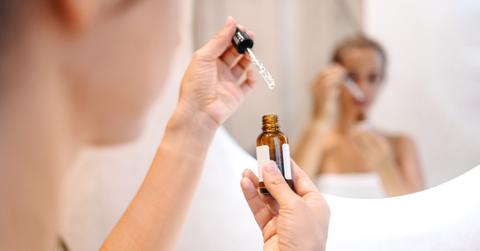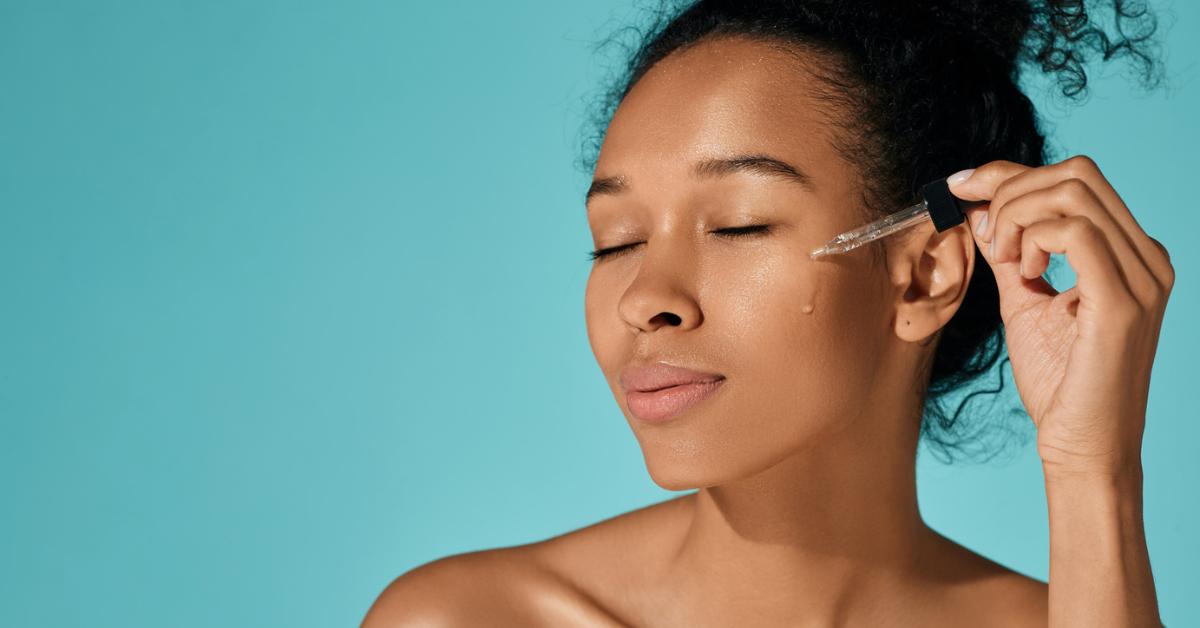Copper Peptides Are Trendy Skincare Miracle Workers — How Does It Compare to Vitamin C?
Published Nov. 23 2023, 8:00 a.m. ET

The Gist:
- Copper peptides: A buzzy skincare ingredient that helps to repair and firm skin and aids in collagen and elastin production.
- Though copper peptides and vitamin C provide similar benefits, they both have a place in skincare.
- Vitamin C is known for its protective qualities, but skincare experts debate about whether copper peptides protect the skin from damage.
The COVID-19 pandemic led to a paradigm shift in the beauty industry. People were retiring the full coverage foundation and clinging to high quality SPF, and slowly gravitating toward the influencer-infused world of skincare. Now more than ever, building a proper skincare routine can be confusing.
Since late 2022, copper peptides have taken SkinTok by storm — Byrdie even called them "nature's botox." According to Biossance, copper peptides, or GHK-Cu, are "a naturally occurring complex made within the human body during times of repair." The metallic superhero has been adored for its smoothing, firming, and healing properties since its 1973 discovery, as per a 2018 scholarly article by Loren Pickart and Anna Margolina.
Since atomic number 29 is fairly similar to staple ingredient vitamin C, skincare enthusiasts are befuddled, slathering their faces with anything that promises a fountain of youth-like effect. Let's compare the two skincare heroes.

What are copper peptides and what do they do?
According to Pickart and Margolina's article, GHK-Cu "is a small, naturally occurring tri-peptide present in human plasma that also can be released from tissues in case of an injury."
Copper peptides can tighten and firm skin, repair skin barrier proteins, reduce signs of aging, improve hyperpigmentation, encourage wound healing, and reduce inflammation.
The amount of copper peptides in the body decreases with aging, as per Real Simple.
"Peptides are applied topically via serums and creams and work by signaling to your cells to produce more collagen and other complex molecules," FAAD and board-certified dermatologist Dr. Tiffany J. Libby told the publication.
Overall, skincare infused with copper peptides (which are either made synthetically or are derived from plants and/or animals) will help you achieve a bouncy, plump, and youthful complexion.
Copper peptides vs. vitamin C: Which is the better skincare ingredient?
According to board-certified dermatologist and YouTuber Dr. Shereene Idriss, incorporating both ingredients into your skincare routine is ideal, as they have different jobs.
For years, it's been drilled into our heads that vitamin C — a brightening antioxidant — is a must for evening out skin tone and neutralizing free radicals.
Well, contrary to some TikTok mumbo-jumbo, Dr. Idriss urges people not to replace their vitamin C with copper peptides.
"Unlike vitamin C, [copper peptides] help to produce collagen and elastin, firming your skin tone, minimizing the appearance of your fine lines, and evening out your skin tone in the process," she explained in a 2023 video.
While both help even out skin tone, Dr. Idriss relayed that copper peptides don't protect the skin like vitamin C does.
"[Vitamin C] protects from the UV damage, it protects from the pollution, it protects from all the free radical damage being created on a daily basis," she continued. "Plus, vitamin C makes your sunscreen work better for you."
However, Pickart and Margolina's paper lists "protect skin cells from UV radiation" as a copper peptide advantage. Additionally, Curology claimed copper peptides "may reduce sun damage" and offer free radical protection.
Though of course, the most important product to protect your face from the sun is a daily face sunscreen.
Here's when you should work copper peptides and vitamin C into your skincare routine.
Though the two are fairly similar, they should be applied at opposite times of the day, according to Dr. Idriss. She advices people use vitamin C in the morning and copper peptides at night.
"Alternate the copper peptides with the retinol, making sure not to use them together because they might [cause irritation]," she concluded.
Retinol, vitamin C, and alpha-hydroxy acids (AHAs) can potentially reduce the powers of copper peptides (though there's skepticism about this), which is perhaps why Dr. Idriss doesn't recommend applying them all at the same time.
Ultimately, consulting with your dermatologist about what works for your unique skin is advisable. But we'd bet a whole lot of pennies that you're enticed by those youthful copper waters.